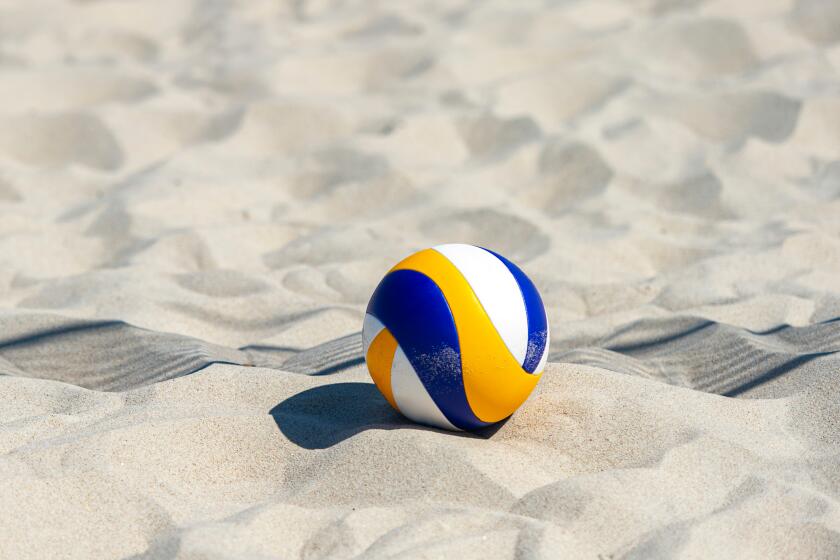TENNIS / JULIE CART : Examining the Marketability of Venus Williams
- Share via
The greening of Venus Williams has begun.
Williams, 15, has played in one professional tournament since turning pro last October and continues to be ardently courted by management companies. There is speculation that her father, Richard Williams, is trying to swing a package deal that includes his youngest daughter, Serena.
The announcement last week that Venus signed a multiyear contract with Reebok comes as no surprise. Clearly the deal is not based on rankings as players receive rankings only after playing in three tournaments.
No, the apparel company’s interest stems from the publicity she generates as a teen-ager and a player of enormous promise. And as that rarest of tennis players--an African American.
Those who came before have not been as blessed. Among Americans, Zina Garrison Jackson and Lori McNeil have labored for a decade on the tour and received precious little in the way of sponsorship money. Garrison Jackson, a Wimbledon finalist, was the No. 2 American and ranked No. 4 in the world in 1989 and didn’t have a racket contract.
There is little rationale for such a situation. In fact, Garrison Jackson was told the reason for sponsor indifference was that, among her other flaws, she was too heavy and her skin was too dark. Garrison Jackson was too classy to respond to such offensive statements.
Conversely, the Williams commercial bandwagon is already groaning under the weight of excess baggage. The phrase “role model” is surgically attached to her name in various press releases. Tennis officials and marketeers alike have quit disguising their glee at the prospect of fresh blood, especially in the form of an excellent athlete with an engaging, down-to-earth manner.
What remains is for Williams to rise above her hype and those who would seek to exploit her in the guise of helping her. Including, unfortunately, her parents. It’s questionable enough that Williams turned pro at 14. But shouldn’t she be allowed to be a teen-ager before she’s made to be a role model?
We are left with an agonizing situation: How wonderful that tennis finally has an African American in the spotlight. How awful that she’s only 15.
*
Back in the amateur ranks, don’t expect Keri Phebus’ life to change dramatically because she won the NCAA singles and doubles titles last week. The UCLA junior will no doubt spend the next few weeks resting and practicing after a long collegiate season and a two-week NCAA tournament in which she played as many as three matches a day.
Phebus will spend the summer playing in tournaments. Her NCAA title gives her an automatic wild card into the U.S. Open.
In the fall, Phebus will be back at school. After summer school and a rigorous schedule during the year, she will be able to do what few athletes do, graduate with her class.
“Getting my degree is the most important goal I have,” she said. “It’s more important than any tennis goals I have, and those are very important to me.”
That attitude greatly assists UCLA Coach Bill Zaima when he recruits. Not only can he say his program has produced the collegiate champion but also a student who chooses to stay in school. More than almost any other coach on campus, he must steel himself for the inevitability that his best players are going to leave before they use their four years of eligibility.
“She enjoys school,” Zaima said of Phebus. “That’s something that’s a recruiting piece, for those who want to go on in school and not to the pros. When I’m talking to kids, what I’m looking for is a two-year commitment. In tennis, I don’t think we can ever take this as more than a year-to-year commitment. But if they leave, we remind them that they can come back and get their degree.”
Recruiting season begins July 1, and Zaima said he’ll not neglect to include Phebus’ titles in his recruiting letters.
Zaima said that he’s rethinking his philosophical stance against recruiting foreign players and for the first time will scout an international junior event.
“I feel, let’s just go out and see what’s out there. Everyone else is doing it,” he said.
*
Tennis Notes
The USTA’s National Junior Tennis League will hold its annual camp on July 29-Aug. 5 at the Canyon Hills Racquet Club in Escondido. The camp, which gives boys and girls 12-14 years-old an all-expenses paid week of instruction, will be held in conjunction with the Toshiba Tennis Classic at La Costa. . . . The Infiniti U.S. Men’s Amateur Championships begin June 15 at clubs around the country. Regional champions in four ratings divisions will compete in the semifinals, held during the Infiniti Open, at UCLA on Aug. 5-6. The finalists will play during the U.S. Open on Aug. 27. Details: 800 499-9625.
More to Read
Go beyond the scoreboard
Get the latest on L.A.'s teams in the daily Sports Report newsletter.
You may occasionally receive promotional content from the Los Angeles Times.











